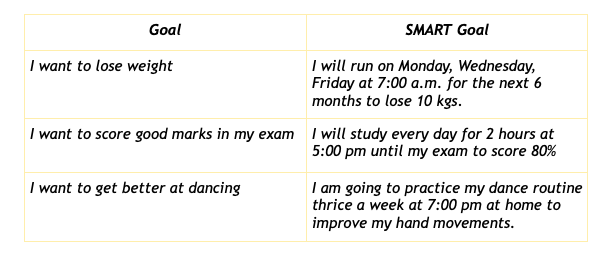Fitness & Wellness
How do you set your goals and achieve them successfully?

Do you set goals but do not follow them consistently? Does more than half of your new year resolutions fail? Don’t know what goals to set? Are you confused whether to set long-term or short-term goals? It doesn’t have to be like this anymore.
Goal setting is a process of selecting a target or a task that you want to achieve. Goals are unique to everyone that helps you to chisel your way to a life that you aspire.
“Every person’s life depends on the process of choosing goals to pursue; if you remain passive you are not going to thrive as a human being.” ~ Locke, 2019
Should you set long-term goals, short-term goals or daily goals?
The answer is all!
Does that mean you set zillions of goals?
No.
Your long-term goals is an illustration of what you want in life or by a significant and distant age or years in future. Short-term or daily goals are the categorization or smaller milestones that will help you achieve your long-term goal.
You start the process of goal setting with identifying your long-term goals and breaking It down to targets that you will achieve in say next five years, then one year. You set tasks that you can do every day, every week, every month to accomplish your long-term goal. For instance, if your long-term goal is to ‘get six-pack abs in 5 years’ then your daily goal will be to exercise, go to gym or eat healthy and short-term goals will be to ‘get two-pack abs in an year and four-pack abs in 2 years’
Setting a long-term goal helps you in making decisions. For instance, your long-term goal of becoming a financial research analyst can guide your decision to choose a course as a student or pick the right job as an employee.
Set Process Goals

Always include the action that you are going to undertake in your goal i.e. the action you are going to perform to achieve the goal.
Follow the SMART framework to set goals
SMART framework helps in setting effective goals that are easier to achieve and give you a sense of direction.
Let’s take a goal for illustration- ‘I want to start exercising to lose weight’.
S- Specific
‘Do your best’ are not the most effective kind of goals. Specific & clear goals are more compelling than vague goals. So, instead of saying ‘I want to exercise to lose weight’ specify how many kilos you want to reduce and what exercise you will do at what time, ‘I will run every day in the morning at 7:00 A.M for 30 minutes to lose 10 kilos’.
Ask yourself a question - ‘What do I want to accomplish?’ to draft a specific goal.
M- Measurable
Your goals should be measurable and should offer a benchmark to strive for. Measurable goals can be tracked and your progress can be assessed. Measuring your progress helps you to maintain your motivation & focus for long-term. It also keeps the excitement alive when you measure your progress.
A- Achievable
Goals that are too challenging or too easy are not as effective as goals that are moderately difficult. This does not mean you do not stretch yourself to achieve your goal but taking big steps too fast may leave you disappointed or frustrated easily. Working with the same ‘losing weight’ example, if you set a goal of losing 10 kilos in a month, it would be unrealistic and you may end up falling sick if you try to achieve that goal. Similarly, running everyday may be too ambitious if you do not exercise at all.
R- Relevant
Take ownership of your goals for its success. Goals that are set by someone else will not fully motivate you to work harder for it. Set your own goals and ensure that your goal is relevant and matters to you. Ask yourself questions like:
- Does this seem worthwhile?
- Is this the right time?
- Does this goal really matter to me?
T- Time-Bound
Attach a timeline to your goal. Make sure your timeline to achieve your goals is realistic. Give yourself enough time to achieve your goal. For instance, I will run thrice a week in the morning at 7:00 A.M for the next 6 months to lose 10 kilos.
 Despite spending hours on setting goal many of us fail to achieve them. This is not because you lack skills or abilities but it is because of the nature of our goals. It is essential to understand the nature of our goals and set SMART process goals to achieve SMART results.
Despite spending hours on setting goal many of us fail to achieve them. This is not because you lack skills or abilities but it is because of the nature of our goals. It is essential to understand the nature of our goals and set SMART process goals to achieve SMART results.
Stay tuned for my next article to know about various tricks and techniques that you can employ in your daily routine to swiftly and smoothly achieve your daily goals.
Also read: Becoming Better - How to develop mental toughness?






